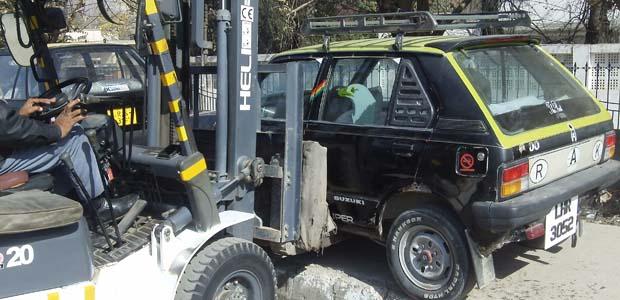VIDEO: Pakistani parking police get high marks for integrity, fine collection method
A car being lifted by fork lift by by the parking enforcement authority in Pakistan. The car was illegally parked. (Photo by Laura Lynch.)
Like many cities around the world, there are a lot of cars in Rawalpindi, and not nearly enough space to park them all.
So when the local journalist I work with suggested parking illegally near a courthouse, I said OK, noticing everyone else
was doing it. And that’s when I got a lesson in Pakistani parking control.
When we returned, our car was gone from its spot, but not far.
A forklift had gently lifted the car and placed it on the sidewalk. The driver was doing the same thing to dozens of vehicles.
He arranged the cars so they were pretty much boxed in, making a quick getaway impossible. His partner, the ticketing officer, explained what was going on.
“This is reserved parking for the lawyers who work at these courts and they’ve designated vehicles with stickers to mark them and they are the only ones allowed to park here,” he said.
That was obvious. But why a forklift and why put them on the sidewalk? Why not just tow them away?
Turns out, there is a very practical answer.
“There’s not a good registration system for vehicles here, so we can’t fine people online or through an electronic system, so we lift the cars and put them somewhere where the drivers can’t get away,” the parking officer said. “Then we fine them to ensure the fine is paid.”
And it works. We paid our fine, the equivalent of just over $2, and we watched dozens of others do the same with very little grumbling.
It was a sight to watch as car after car was lifted, carried, set down and then lifted again and returned to their owners as the fines were paid.
One other notable point. It turns out the police who monitor parking and the highways have been praised by anti-corruption group Transparency International for their integrity.
That’s no small feat in what is otherwise one of the world’s more corrupt nations.
Our coverage reaches millions each week, but only a small fraction of listeners contribute to sustain our program. We still need 224 more people to donate $100 or $10/monthly to unlock our $67,000 match. Will you help us get there today?
